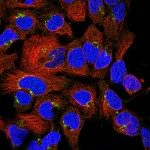Link to Pubmed [PMID] – 30209134
J. Cell. Sci. 2018 Oct;131(19)
Tunneling nanotubes (TNTs) are actin-enriched membranous channels enabling cells to communicate over long distances. TNT-like structures form between various cell types and mediate the exchange of different cargos, such as ions, vesicles, organelles and pathogens; thus, they may play a role in physiological conditions and diseases (e.g. cancer and infection). TNTs also allow the intercellular passage of protein aggregates related to neurodegenerative diseases, thus propagating protein misfolding. Understanding the mechanism of TNT formation is mandatory in order to reveal the mechanism of disease propagation and to uncover their physiological function. Vesicular transport controlled by the small GTPases Rab11a and Rab8a can promote the formation of different plasma membrane protrusions (filopodia, cilia and neurites). Here, we report that inhibiting membrane recycling reduces the number of TNT-connected cells and that overexpression of Rab11a and Rab8a increases the number of TNT-connected cells and the propagation of vesicles between cells in co-culture. We demonstrate that these two Rab GTPases act in a cascade in which Rab11a activation of Rab8a is independent of Rabin8. We also show that VAMP3 acts downstream of Rab8a to regulate TNT formation.



